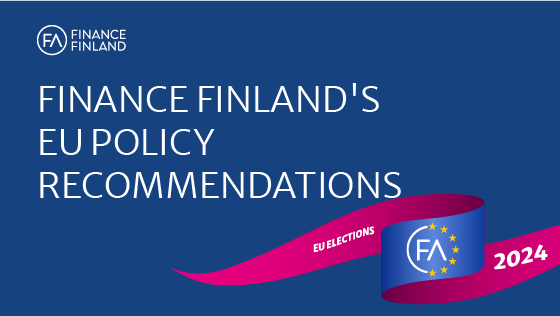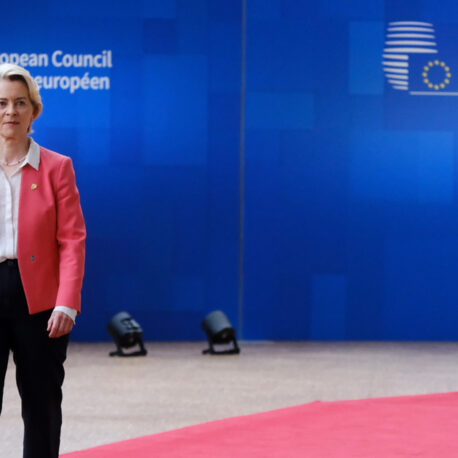
This spring will be buzzing with interesting discussions and negotiations regarding the outlines of the next Commission’s work programme and the priorities of the soon-to-be-elected MEPs. Finance Finland will be representing the Finnish financial sector’s positions in this dialogue in both Finland and Brussels.
In January, the Finnish Government outlined Finland’s key EU policy objectives for the next five-year period and set strengthening Finland’s EU objectives and lobbying efforts as a key priority for each ministry. The aim of the new strategy is to improve the effectiveness of Finland’s influencing efforts and to enhance the exertion of advance influence at the EU level. Finance Finland commends the Government for its new approach and is looking forward to being an active participant in the setting of priorities.
The Finnish Government’s long-term key EU policy priorities are strengthening Europe’s strategic competitiveness, improving comprehensive security in Europe, and promoting a clean transition and the bioeconomy and circular economy.

Take a closer look at our objectives for the 2024-2029 term
These priorities are very similar to the key objectives defined by the Finnish financial sector.
Stability and competitiveness are key
The financial sector plays a key role in maintaining functional and secure infrastructures in society. At both national and European level, it generates and finances growth and business, provides protection against risks and supports the transition towards a green and digital society. The sector is a vital piece in the ecosystem of open strategic autonomy.
The EU must ensure its own competitiveness when drafting regulation. This must be done by enhancing the functioning of the single market and ensuring a level playing field for all member states. Excessive or low-quality regulation is detrimental to private and retail investment and the green transition.
The challenges of the European operating environment have only increased financing needs. The public funding of the twin transition needs to be supplemented with more private funding. Access to diverse corporate finance in Europe must be safeguarded.
======
Current regulation still contains obstacles
that block the cross-border flow of capital.
======
We consider it important to continue the work on a stronger and more integrated capital markets union in the EU. In this work, the diversity of private funding and the movement of capital must be guaranteed. Current regulation still contains obstacles that block the cross-border flow of capital. Another barrier to cross-border activity is a fragmented regulatory environment so it important to ensure that the member states’ national regulation and supervision is both uniform and efficient. Centralised supervision is better suited for market participants that are in a systemically significant position and engage in significant cross-border activity.
We also consider it vital to highlight member states’ responsibility for their own finances and to emphasise the role of market discipline. The limits of economic risk sharing must be clearly defined, and before any steps in this direction are taken, the risks of each member state’s banks must be reduced, and present problems fixed. When the final elements of the Banking Union are built, the costs must be fully borne by banks’ investors. If a European deposit insurance scheme is implemented, it must be based on liquidity support in the form of lending and have strict conditions.
The quality of regulation must be improved
The Finnish financial sector is committed to the EU’s sustainable development goals. In addition to the mitigation of climate change, important priorities in future regulation include the prevention of biodiversity loss and the improvement of social responsibility.
A large volume of EU sustainable finance regulation has been prepared in recent years, and more is currently being prepared at a rapid rate. The internal compatibility and clarity of this regulation leaves room for improvement. Incompleteness and inadequate timeframes for entry into force cause problems during implementation and result in incorrect or inconsistent interpretations. Misdirected regulatory burden also jeopardises the achievement of the objectives of this otherwise valuable regulation.
Finance Finland considers comparable and clear data essential for sustainable finance business decisions. It is important to prevent greenwashing to safeguard the commensurability of markets. The existing definitions in the sustainable finance taxonomy should be clarified and harmonised.
======
Policymakers must strike a balance
between leeway that facilitates innovation
and restrictions that prevent adverse effects.
======
The financial sector is a significant actor also in the field of digitalisation as a developer, user and financer of services and innovation. For the EU to be a competitive global operator, its policymakers must strike a balance between leeway that facilitates innovation and restrictions that prevent adverse effects. Regulation must enable the provision of solutions that are sustainable for business. It must be market-based and technology-neutral and address key risks in the market and in investor protection.
Before drafting new regulation, existing regulation must be examined critically. The review cycle must be lengthened, and regulation must not be reviewed before there is enough experience of how existing regulation functions. Impact assessments must be improved, and the combined impact of different regulations must be assessed already during the drafting process.
The European Commission’s objectives must be consistently aligned, and conflicts between proposals must be identified. The European institutions do not currently comprehensively assess the combined impact of regulations or the potentially important proposals that emerge during the negotiation process.
Still have questions?
|Contact the columnist
Looking for more?
Other articles on the topic

Hooray for simplifying regulation! But obligations must be streamlined thoughtfully, without compromising environmental goals

Putting EU citizens’ savings to work – Commission seeks growth by promoting saving and investment

Finance Finland’s CEO Ahosniemi: The Commission makes grand declarations for better regulation but fails to back them up with concrete measures in its work programme

The EU needs to build a more favourable investment climate




